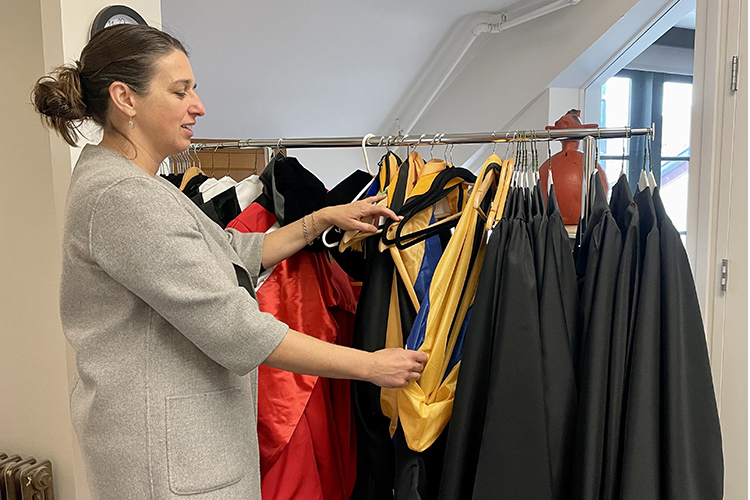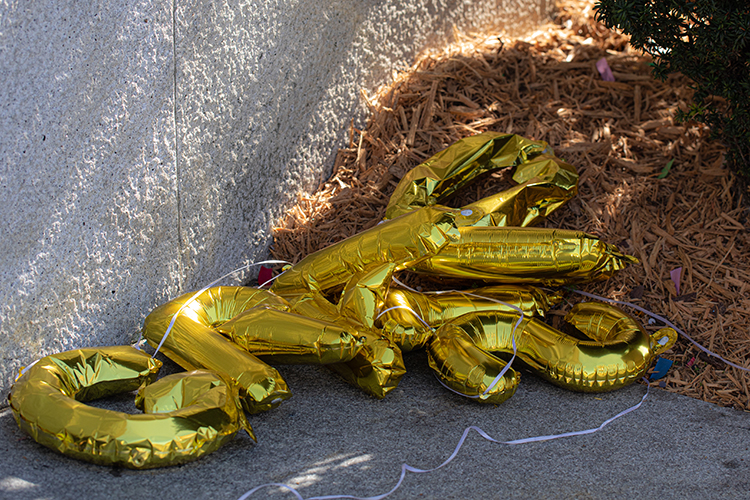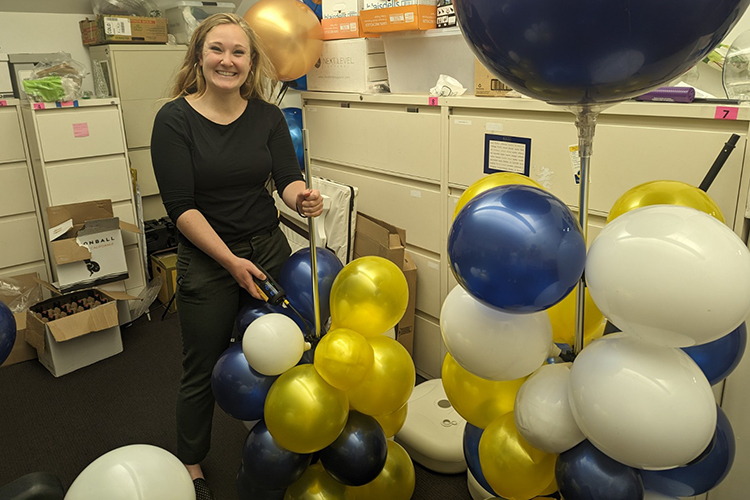Graduation season is getting greener at UC Berkeley
Eco-friendly changes to a growing number of graduation events include rental regalia, QR codes and aluminum water bottles.
May 5, 2023

Rental regalia, QR codes to view programs, reusable vinyl balloons and aluminum water bottles are sprouting at UC Berkeley this month in an effort to make graduation season more eco-friendly. (UC Berkeley image by Neil Freese, incorporating photography courtesy of Han Chenxu, Doug Kelley, Ryunosuke Kikuno, Ananthu Selvam and Annie Spratt via Unsplash)
From banners, balloons and bouquets to stoles, neckties and even face masks, UC Berkeley graduation events are all about blue and gold.
And, increasingly, green.
This year, multiple efforts are underway to hold more environmentally friendly ceremonies and receptions and to urge graduating students to celebrate without harming the campus landscape.
For the first time, students can rent, not just buy, graduation robes at the Cal Student Store, and changes at some events will include programs made available through a QR code to replace paper copies; finger foods to eliminate the need for utensils; and water in individual aluminum bottles rather than single-use plastic ones.
In addition to the campuswide commencement on May 13, there are nearly 90 graduation ceremonies this month being held by individual academic departments and student groups.

Amanda Okamoto examines a collection of regalia for Energy and Resources Group graduates that was donated by former graduates. (Image: Candace Groskreutz)
Students in regalia already can be seen throughout campus, posing for graduation photos and videos. But this year, they’re being asked to not litter the grounds with plastic confetti, streamers, deflated balloons and champagne glasses, as well as champagne corks, empty bottles and spilled alcohol.
“Not only are we damaging our campus spaces, this is causing environmental havoc in our local ecosystem,” Melinda Byrne, president of the Senior Class Council, said in a recent email to graduating students. She added that confetti has been found floating in Strawberry Creek.
“I have personally had the privilege of exploring and researching (the creek) during my time as a molecular environmental biology student,” she added, “and it is disappointing that we are not showing it the proper respect.”
At the Haas School of Business, Danner Doud-Martin, director of Haas campus sustainability, has purchased one solution: confetti made from real leaves. She’s providing small packets for Haas students to pick up, while supplies last, at the Haas Undergraduate Program office.

A heap of deflated gold metallic balloons that spelled out the year 2023 lie in a heap on a campus sidewalk. (Image: Brandon Sanchez Mejia)
QR codes reduce need for printed programs
Lengthy, printed graduation programs will be a thing of the past at several ceremonies this month. They’re being replaced by QR codes, which allow guests to view programs on their phones.
“Historically, we’ve seen too many beautiful printed programs end up in the trash after the ceremony,” said Alicia Slater, events manager for the School of Public Health, which is minimizing the length of its printed program by providing a QR code that lists its nearly 600 graduates’ names.
The Rausser College of Natural Resources also will provide its graduation guests with a QR code. Just one sheet of paper will be handed to them at its May 14 ceremony, and it will include the QR code, the order of events, and citation and award winners.
“We have one commencement ceremony per year, and we used to provide a full program, about 20 pages, to each party in attendance,” said Craig Crossley, an intake adviser for the college’s Office of Instruction & Student Affairs. “My estimate is that we will save about 24,000 sheets of paper per ceremony!”

At Berkeley Haas, Amber Van Meter, program coordinator for the Haas Office of Sustainability and Climate Change, pumps up vinyl reusable balloons that staff and students can repeatedly use for their events. The school has banned single use balloons. (Image: Danner Doud-Martin)
Eliminating single-use plastic bottles
At the Berkeley Haas, 16-ounce aluminum bottles of water with screw-top lids will be provided to everyone at the school’s May 16 and 19 ceremonies, said Doud-Martin.
“I’ve ordered 1,800, and they can be reused or recycled. We’re excited not to have plastic water bottles at graduation,” she said. “We’re absolutely trying to follow through with our zero waste efforts around single-use plastic, which we’re trying to eliminate before our 2030 mandate.”
In 2020, the campus committed to eliminating all non-essential, single-use plastic with viable alternatives by 2030, a target that goes beyond food ware and plastic bags and addresses products and packaging used in campus academics, research, administration and events.
The School of Public Health will distribute boxed water to its graduating students and staff volunteers on May 15 at the Greek Theatre, said Slater, adding that “zero waste starts with zero plastic bottles.”
For the all-campus commencement at California Memorial Stadium, a festival-style water station is being installed to allow students and guests to refill their own soft-plastic water bottles; members of the audience will be urged to share programs, as fewer are being printed; and no balloons, banners or signs are permitted.
“Our aim is for all to have a wonderful time at the ceremony,” said University Development and Alumni Relations (UDAR) spokeswoman Elizabeth Costello, “and to continue to reduce the environmental impact of our events.”

Plastic confetti, tossed into the air to create lively graduation photos, litters the campus and even blows into Strawberry Creek. (Image: Brandon Sanchez Mejia)
Rental regalia gains traction
Students who choose to wear regalia can now rent instead of buy their graduation gowns through the Cal Student Store, which has partnered on the pilot project with UDAR and Cal Zero Waste, a campus office that offers recycling, composting and refuse pickup, and other services.
“We’re starting with 1,000 rental gowns at the Cal Student Store this graduation,” said Lin King, manager of Cal Zero Waste, adding that discussions have begun about whether to only offer rentals at the store for the 2023-24 academic year.
Earth911, one of the largest recycling databases in the country, reports that each year, more than 5 million people wear graduation gowns — nearly all of them are made from polyester, which doesn’t fully decompose in landfills — and most are thrown away.
Berkeley Haas is encouraging Haas students to rent regalia from the Cal Student Store, said Doud-Martin. As an incentive to those who do, they can enter a Haas raffle for prizes that include a $150 gift card to Patagonia, one of the most sustainable outdoor apparel brands.
She said the school also is loaning 50 used robes to full-time MBA students this spring that it’s been collecting for a few years, adding, “We want to build that inventory.”
Another option that has been allowed at Berkeley’s commencement since 2020 is for students to skip regalia altogether, said Caroline Allum, director of external relations for UDAR, which worked with the Senior Class Council to alert graduating seniors to more sustainable graduation practices.
“You may also dress in business casual or cocktail attire,” Byrne wrote in her email to seniors. She said she’s chosen to wear the cap and gown her sister wore when she graduated from UC Santa Barbara in 2019.
“Plastic production is projected to increase by 40% in the next 10 years,” said Byrne. “At this rate, oceans will carry more plastic than fish, by weight, by 2050.”

Students majoring in Conservation and Resource Studies paint donated pots for the “living diplomas” that are part of their annual alternative graduation event. (Image: Thuy-Tien Bui)
Donated dishes, DIY decor, living diplomas
Donated regalia also will be in use by the Energy and Resources Group, which has one graduation ceremony per year, in the spring, for about 12 to 15 master’s degree students and five to seven Ph.D. students. Amanda Okamoto, the group’s manager, added that audience members will follow the program on their phones through a QR code, and that the reception will feature glassware donated by a professor and “only finger foods, to eliminate utensils.”
Compostable and second-hand materials, including plates, utensils and cups, will be used at “Alt-Grad,” an alternative graduation for Conservation and Resource Studies that’s been fixture for nearly 50 years, and a compost bin will be set up to continue the group’s zero waste mission, said Thuy-Tien Bui, an organizer of this year’s event, along with Addison Eftekhari. Both students are graduating this spring.
Conservation and Resource Studies is a self-designed, interdisciplinary program for students interested in environmental issues. Alt-Grad will be held this year under a large coast live oak in the Briones Regional Park Newt Hollow Picnic Area and feature DIY decorations, including an archway of fallen eucalyptus branches, pine cones and dried citrus garlands. Refreshments will be locally sourced, and students will forgo regalia.
Each year, “living diplomas” — living plants — are gifted to graduating seniors by students who are newcomers to the major and who have chosen, grown and cultivated the plants. This year, said Bui, they will be a variety of wildflowers and oaks native to California, presented in donated pots that were decorated earlier this week at an outdoor pot-painting session.
“It’s a ceremony unlike any other … that proudly reflects the ideals of our close-knit Conservation and Resource Studies community,” said Caitlin Grace, who also is a fourth-year student in that major. “Just like our graduates will grow and thrive post-college, we hope that these plants will, as well.”